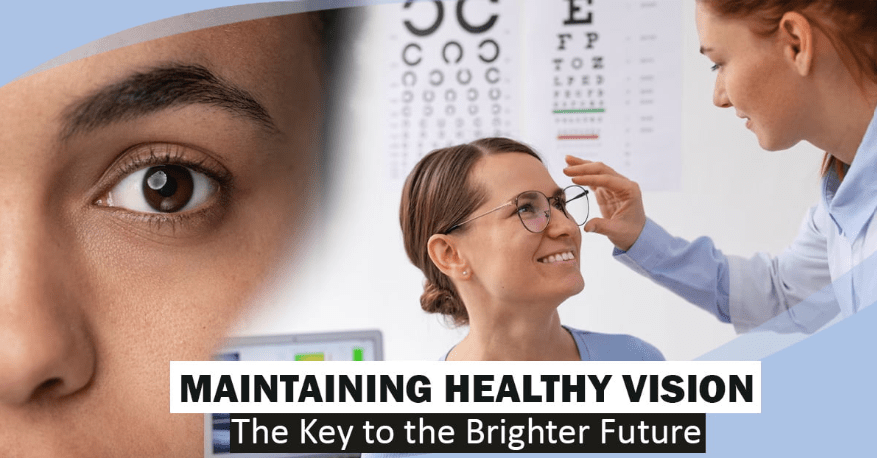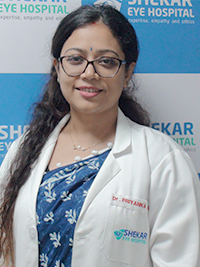Why Eye Health Matters
The eyes are our windows to the world, yet they often go overlooked until problems arise. With increased screen time, pollution, and lifestyle challenges, maintaining good eye health has become more crucial than ever. This blog will explore practical strategies to preserve your vision, detect early warning signs of problems, and adopt a proactive approach to eye care.
1. The Building Blocks of Eye Health
A Balanced Diet for Bright Eyes
Your diet plays a significant role in eye health. Incorporate foods rich in:
- Vitamin A: Found in carrots, sweet potatoes, and spinach.
- Omega-3 fatty acids: Present in salmon, walnuts, and flaxseeds.
- Lutein and Zeaxanthin: Found in leafy greens like kale and broccoli.
- Stay Hydrated: Dehydration can lead to dry eyes. Drink at least 8 glasses of water daily to keep your eyes moist and comfortable.

2. Shielding Your Eyes from Harm
Protective Eyewear
- Blue Light Glasses: Reduce digital eye strain caused by prolonged screen use.
- UV-Protected Sunglasses: Guard against harmful UV rays, which can lead to cataracts and macular degeneration.
- Avoid Rubbing Your Eyes: Touching your eyes transfers dirt and bacteria, increasing the risk of infections like conjunctivitis.
3. Healthy Habits for Long-Lasting Vision
- The 20-20-20 Rule
Combat digital eye strain by looking away from your screen every 20 minutes for 20 seconds, focusing on something 20 feet away.
- Quit Smoking
Smoking increases the risk of eye diseases like cataracts and age-related macular degeneration.
- Get Enough Sleep
Sleep allows your eyes to recover from the day’s strain. Aim for 7-8 hours of quality sleep.
4. Recognizing Warning Signs Early
Common Symptoms of Eye Problems
- Blurred vision
- Persistent dryness or itching
- Redness or swelling
If these symptoms persist, consult an eye specialist promptly.
Importance of Regular Eye Exams
Adults should have an eye check-up every 1-2 years.
Those with diabetes, hypertension, or a family history of eye diseases need more frequent visits.
5. Eye Exercises: Fitness for Your Eyes
- Palming Technique
Rub your hands together to create warmth, then gently place them over your closed eyes to relax them.
- Eye Rolling
Roll your eyes in circular motions to alleviate strain and improve flexibility.
- Focus Shifts
Switch focus between a near object and a distant one to strengthen your eye muscles.
6. Lifestyle Changes for Optimal Eye Health
- Limit Screen Time
- Take breaks and use anti-glare screens to reduce eye strain.
- Keep Your Environment Eye-Friendly
- Use proper lighting while reading or working.
- Maintain a comfortable distance from screens.
Frequently Asked Questions (FAQs)
1. How often should I get an eye check-up?
Adults should visit an eye specialist every 1-2 years, even without symptoms. For individuals with conditions like diabetes, annual check-ups are vital.
2. Can screen time permanently damage my eyes?
Excessive screen time can cause temporary digital eye strain but doesn’t usually lead to permanent damage. However, chronic strain can contribute to dry eyes and headaches.
3. What are the best foods for eye health?
Foods rich in Vitamin A (carrots, spinach), Omega-3 fatty acids (salmon, walnuts), and antioxidants like Lutein (kale, broccoli) are excellent for eye health.
Conclusion: Vision Is a Lifetime Treasure
Caring for your eyes today ensures a future filled with clear, vibrant experiences. By following these tips, adopting a healthy lifestyle, and consulting with professionals at Shekar Eye Hospital, you can safeguard your vision for years to come.
Your eyes deserve nothing but the best—start your journey to perfect eye health today!






